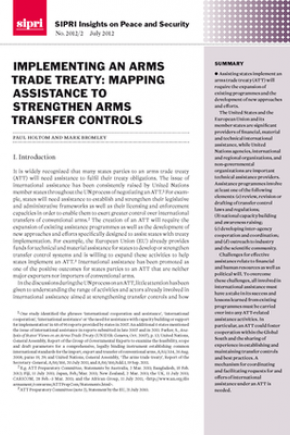Implementing an Arms Trade Treaty: Mapping Assistance to Strengthen Arms Transfer Controls
It is widely recognized that many states parties to an arms trade treaty (ATT) will need assistance to fulfil their treaty obligations. The creation of an ATT will require the expansion of existing assistance programmes as well as the development of new approaches and efforts specifically designed to assist states with treaty implementation.
Understanding the strengths and weaknesses of existing assistance could help to ensure that mistakes made under other instruments are not repeated and enable actors to draw on existing good practices. This paper therefore maps existing assistance efforts aimed at strengthening transfer controls for conventional arms, dual-use goods or small arms and light weapons (SALW).
I. Introduction
II. Assistance to strengthen transfer controls
III. Transfer control assistance: Actors and activities
IV. Challenges for international assistance
V. Conclusions and recommendations


